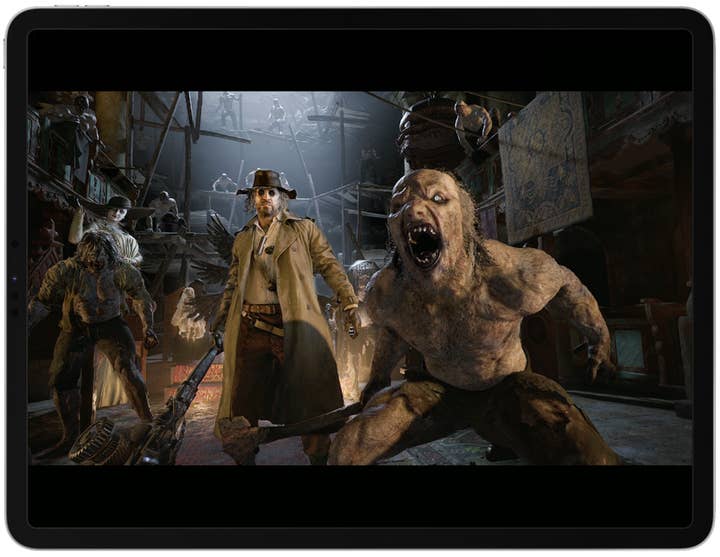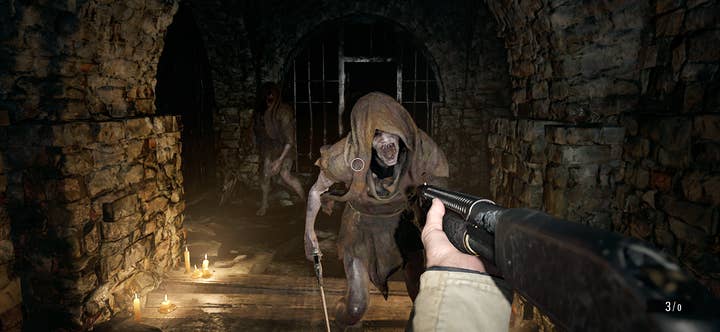What Resident Evil Village on iOS tells us about the future of AAA mobile game development
Capcom's producers share their insight on closing the gap between console and mobile development
Sign up for the GI Daily here to get the biggest news straight to your inbox
When you play Resident Evil Village on an iPad Pro, it's flabbergasting to believe that this is Capcom's latest mainline entry running natively on a mobile device, looking every bit as good as its home console counterparts.
It feels like alchemy when considering the most recent port of the game to a handheld device was the cloud version on Nintendo Switch. Factor in the rise of cloud-dedicated devices like Logitech G Cloud and Razer Edge, plus cloud gaming services like Xbox Game Pass Ultimate and GeForce Now, and the assumption would be that the only practical way to experience the most bleeding edge titles portably is via streaming.
But Apple's inclusion of its powerful M2 chip inside its latest devices, including the sixth-gen iPad Pro released last year, and most recently the iPhone 15 Pro, means that developers finally have the power of a high-end console in their hands.
There are nonetheless some unique circumstances that make Resident Evil Village a smooth port to iOS, namely that Capcom had already ported the game to MacOS last year compatible with machines with the M2 chip.
"We could reach a point where we're able to target [mobile] alongside current-gen consoles"
Tsuyoshi Kanda, Capcom
"We have a relationship with Apple that existed previously to this latest hardware [iPhone 15 Pro] being released," Masachika Kawata, one of Resident Evil Village's producers, tells GamesIndustry.biz. "But we just saw the new M2 chip as a great chance to bring Resident Evil to more players around the world and we're always happy to have that kind of chance. We were very happy with how powerful [the M2] was as well and what it led us to achieve with this port."
It's clear then that it's taken the power of the Apple's M2 chip to realise AAA game ports, hence why porting Village was not considered for devices without it, such as the also newly-released iPhone 15 or any competitor on Android, although Kawata doesn't rule this out in the future.
More importantly, Capcom's development team, who also ported Village internally, also got a headstart on the iOS port because of its MacOS port of the game last year.
"We had already done the preparation steps last year of updating our internal RE Engine to support MacOS development, so with that groundwork in place, it was a relatively easy procedure to also continue that work this year into iOS," Kawata continues. "There's some similarities between the platforms, which means that once you start working on one, it helps with the next one."

He adds that it is arguably down to working with Capcom's internal RE Engine, already lauded as one of the most versatile engines for the company's titles since its debut with 2017's Resident Evil 7, that has meant developing for iOS with the M2 chip feels almost no different from developing for a current-gen console, although there are still minor considerations such as screen size.
If there is any drawback, it may be that by porting Village to iOS like any other console title means it hasn't been optimised with any unique mobile features, such as dedicated touch, swipe or motion controls. Our hands-on had been with a DualSense controller, while the only other control scheme is with a rather awkward virtual touch controller overlaying the screen.
"We have included options in the game that allows players to adjust not only the position of each button on the screen, but also the size relative to each other," Kawata adds. "So while we've left it sort of an orthodox style from default, players are welcome to and are able to make a more mobile-customised experience as they play by changing those options themselves."
"We saw the new M2 chip as a great chance to bring Resident Evil to more players around the world"
Masachika Kawata, Capcom
In any case, things have come a long way since the original Resident Evil 4's infamous mobile version more than a decade ago, and when there continues to be controversy over compromised Switch ports of big budget titles like Mortal Kombat 1, to see Village on parity with its current-gen versions is a sight to behold.
While the iOS version of Village is being sold separately from the MacOS version, the future port of Resident Evil 4 has been a guaranteed universal purchase so that users need to only buy the game once to play on any Apple M2-powered hardware. But by the time Resident Evil 9, for example, comes along, could we see a likelihood that iOS just becomes one of the other current platforms that a new game releases simultaneously as is the norm?
Of course, as has been the case with console and portable, it won't be a surprise if the next generation of PC and console hardware becomes vastly superior to what the M2 is capable of and then the latter is back to chasing parity. Nonetheless, it's a future that producer Tsuyoshi Kanda seems optimistic about.
"I think it's definitely feasible in future, especially considering how the annual upgrade cycle of mobile hardware for smartphones and tablets just continued to get better and better every year," he says. "We could reach a point where as part of the multi-platform strategy, we're just able to target these devices alongside existing current-generation consoles."
Kawata concludes our conversation with a more tempered response. "At the moment, our process is still based on the idea of taking products we've released previously on other platforms, so we're not ready to commit to things like simultaneous release in terms of future titles," he explains. "Since there's a lot of unknowns for us during this process, we brought them to the Apple devices in question, and we want to try and get feedback on that and consider how to improve next time we do something like this, and we'd like to do better and better with each iteration."
Sign up for the GI Daily here to get the biggest news straight to your inbox










